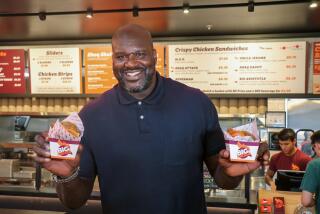Group Led by Jacobs Proposes to Buy Shaklee for $528 Million
- Share via
A group led by Minneapolis investor Irwin L. Jacobs announced Friday a long-anticipated proposal to buy Shaklee Corp., a marketer of foods, vitamins and personal care products, in a deal valuing the company at $528 million.
Jacobs has been steadily buying shares in San Francisco-based Shaklee, and his investment group already holds close to 15% of the company’s 13.2 million outstanding shares. In response, Shaklee has taken steps to prevent a possible takeover attempt.
In February, Shaklee sold a 78% stake in its profitable Japanese subsidiary to Tokyo’s Yananouchi Pharmaceutical for $350 million. On Thursday, it declared a $20-a-share special dividend for stockholders.
But Jacobs, whose tentative offer for Shaklee amounts to $40 a share, told the Dow Jones News Service on Friday that “we didn’t think too much of the dividend and the market clearly didn’t either. We think Shaklee Corp. is worth more than the value the market is putting on it.”
The buyout offer was revealed after the close of trading on the New York Stock Exchange on Friday. In composite trading, Shaklee closed at $34 a share, down 50 cents. The stock rose $4 a share after Shaklee sold the stake in its Japanese unit, but the shares have not risen above $36.25 in the last year.
Colorful Past
Dan Williams, an analyst with Sutro & Co. in San Francisco, told United Press International that the offer was slightly higher than he would have expected for Shaklee. “I’m a little hard pressed to explain what is the attraction of the company,” Williams said.
Shaklee, which sells its products through a international network of 10,000 independent distributors, has had a colorful past. It was founded in 1956 by the late Forrest C. Shaklee Sr., a chiropractor, and his two sons, Raleigh L. and Forrest Jr.
From the beginning, the elder Shaklee pitched the company’s products as in “harmony with nature,” a theme the company continues. But over the years, the elder Shaklee was accused of making outrageous health claims about the products, and the Food and Drug Administration charged in 1976 that the company mislabeled some of its goods.
Motivated by cash, cars and convention trips, Shaklee’s sales agents traditionally have been very loyal to the company and fervent in their recruitment of additional distributors. In recent years, however, the company has lost some of its luster. With more women in the work force seeking full-time jobs, the company has been hard-pressed to maintain its sales force.
In addition, some analysts considered the company’s Japanese operations, which have accounted for 40% of the company’s earnings, among its most valuable assets.
The conditional offer from the Jacobs group, which includes Minneapolis investor Carl R. Pohlad, has a provision to reduce the price by $20 a share if Shaklee actually pays its special dividend to shareholders.
Earnings Improved
David M. Chamberlain, Shaklee’s president and chief executive, said the letter from Jacobs outlining the takeover proposal had been referred to the company’s directors. Chamberlain declined additional comment.
Shaklee’s sales and earnings improved in 1988 over the prior year, but the company’s profits were far below what it reported in 1986.
In 1988, Shaklee earned $27.2 million, up 16% from 1987. Sales rose to $627 million from $572 million in the prior year. The company said the improved earnings reflected sales growth in its Bear Creek subsidiary, the nation’s largest direct mail marketer of fruit and gourmet foods.
More to Read
Inside the business of entertainment
The Wide Shot brings you news, analysis and insights on everything from streaming wars to production — and what it all means for the future.
You may occasionally receive promotional content from the Los Angeles Times.










